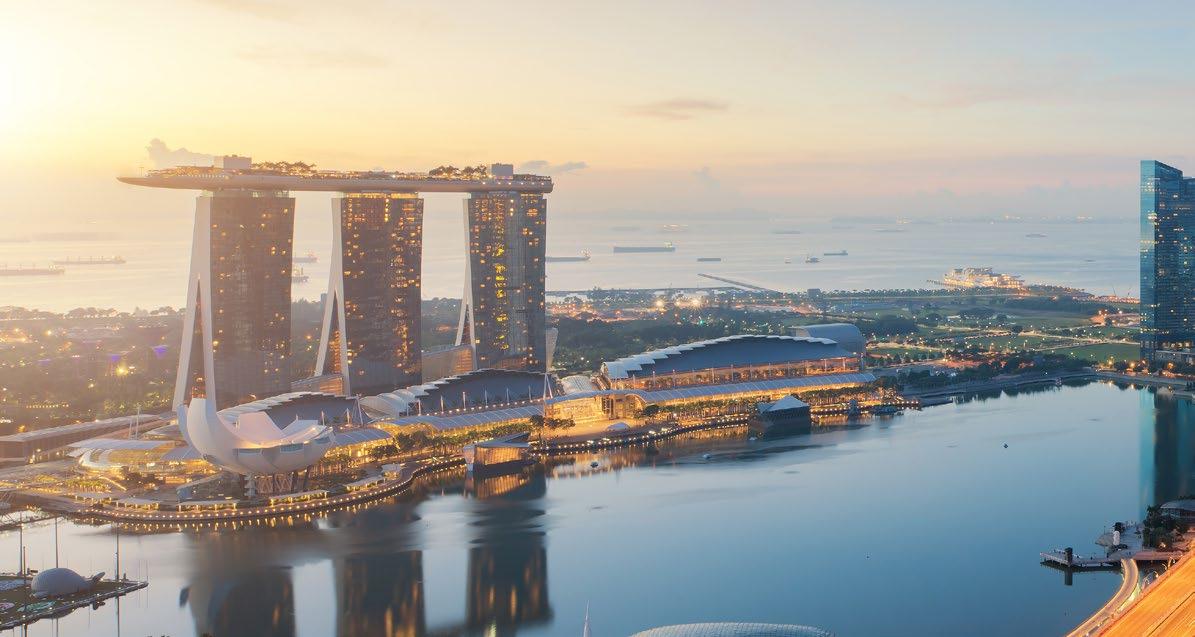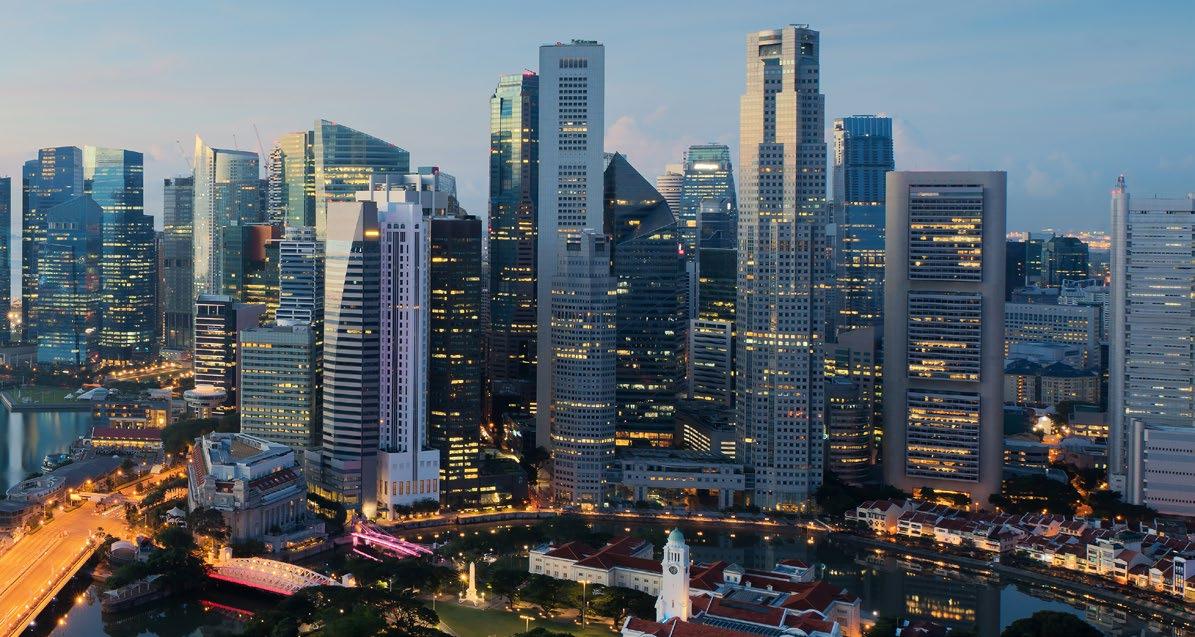
6 minute read
WHAT ASIA’S FAMILY FIRMS CAN TEACH WESTERN BUSINESS ABOUT PURPOSE
ONG BOON HWEE AND MARK GOYDER
Ong Boon Hwee is CEO of Stewardship Asia Centre. Mark Goyder is founder of Tomorrow’s Company. Joint authors of the new book, ‘Entrusted – stewardship for responsible wealth creation’ is published by World Scientific.
Advertisement
In the book Ong Boon Hwee and Mark Goyder argue that companies can thrive if they rediscover stewardship, balancing the needs of shareholders, community and environment.
“Nothing has ever belonged to me. I believe the key for continuity and long-term prosperity is to maintain inherited assets as if they are not my own properties. They are under my management and governance. Thus, understanding this mission, we have to work hard to grow the value and assets, in both quantitative and qualitative terms.” These are the words of Zengoro Hoshi, the current patriarch of a 1,300-year-old company, which operates the world’s second-oldest hotel, Hoshi Ryokan. needs of business, community and environment.
In a 2017 study of 200 successful and enduring family businesses in Asia Pacific by Stewardship Asia Centre, 80% agree that their organisation has a clearly articulated purpose, which is crucial to the development of the organisation. In the same study, business leaders ranked uplifting the community as the key priority out of a list of nine. It is significant that profitability came in seventh, and
Founded in 718, this Japanese familyrun business has flourished for 46 generations. The family has not only grown the inn business over the years, but as part of the company’s conservation efforts, the inn makes a point of caring for the hot spring on which it is built, which it regards as a precious gift from nature. Coupled with its philosophy of ‘less greed and realisation of enough’, the family seeks to maintain a balance between the
the leadership trait that the leaders believe to be most crucial is the long-term vision that ensures that the business consciously builds for the future. Of course a successful business must first be profitable. Yet multigenerational businesses recognise that to be successful, a ‘profits-only’ approach mantra is unsustainable. There is an interdependence between companies that thrive, the relationships they nurture, and the stakeholders and community they impact upon. Intuitively, these companies inject the
spirit and principles of stewardship into their business decisions to build organisations that embrace responsible wealth creation.
In our joint research, and in dialogue with hundreds of leaders, owners, and stakeholders of business, we observed that stewardship is nothing new to people in business, east or west. While terms used may differ, stewardship values and concepts are often universal – responsible ownership, sense of purpose, long-term perspective, relationship and community focus. These values are supported by three stewardship elements: the will to act by the individual; being mindful of balancing present and future demands; and recognition that stewardship is about creating value and wealth in an interdependent manner.
Founded 186 years ago, and now in its eighth generation of leadership, Ayala Corporation is one of the leading and oldest industrial conglomerates in the Philippines. In 1997, Ayala signed a water concession agreement to operate the water and sewer systems of Metro Manila’s east zone. Its CEO, Jaime Augusto Zobel de Ayala, felt that “proper water management was critical for the economic development of Manila” and saw an opportunity for Ayala to contribute to nation building. Such a move is aligned with the founder’s aspirations. From the outset, Ayala’s founder Antonio de Ayala emphasised the importance of being a steward to ensure the success of the company and all its stakeholders.
From generation to generation, the spirit of stewardship has been passed down to succeeding leadership and the company as a whole. In 2014, Ayala was awarded the prestigious IMDLombard Odier Global Family Business Network International award, an award that “celebrates the impact of familyrun firms on the global economy.”
In essence, the corporation was recognised for its “strongly rooted values; long-term, strategic partnerships; commitment to family leadership and stewardship; consistency of values across generations; contribution to the nation’s development and its integration into the family’s long term business interest; and well-planned succession policies.”

This is stewardship in action – to manage, nurture and grow what has been entrusted so that we can hand it over in a better shape, and in the process benefit society and safeguard the interests of future generations. Excellent examples of stewardship in action can be observed in businesses both East and West. From Banyan Tree in Singapore to Patagonia in the US, and Tata Group in India to Unilever in Europe. The challenge is to foster stewardship progressively across geographies and along the entire value chain – from asset owners, asset managers, investors, shareholders, boards of directors, management, policy makers, regulators and down to the employees and individuals, so that it is the norm rather than the exception.
In the world of stewardship in action, there will be many instances where decision-makers face dilemmas and have to reconcile short-term pressures with the desire to run for the long-term. Elaborating on the importance of acting today with tomorrow in mind, CEO of Temasek Holdings, Ho Ching says: “We do recognise that you cannot be there for the long term if you don’t take care of your short term. One cannot have 30 bowls of rice 30 years from now, and zero bowls for the next 30 days. There has to be a balance between the shortterm and longer-term deliverables. But if we over-focus on the short-term deliverables, we may run the risk of doing that at the expense of [the] long term.”
Temasek defines in its charter its goal to be an active investor, a forwardlooking institution and a trusted steward. Guided by an ethos of sustainability and good governance, Temasek adopts a long-term horizon for its investment activities. It is constantly reshaping its portfolio for sustainable long-term returns to deliver for future generations, and its returns are generally retained for reinvestment. The Singapore State Investment Company recently announced its commitment to go carbon neutral by 2020, and to halve greenhouse gas emissions of its entire portfolio by 2030.
The rediscovery of stewardship is urgently needed if our businesses are to play their full part in tackling economic and social divides, the climate and biodiversity emergencies. We need every ounce of human ingenuity if societies are to be set on a less damaging course than at present.
We need to galvanise the energy of forwardthinking companies, and the versatility of markets to transform our system of wealth creation.
The challenge is this: how to make our system of wealth creation no less adventurous, but at the same time more human, more honest, more responsible, more inclusive, more engaging, and more respectful of the needs of our grandchildren.

In healthcare, the most long-lasting and effective help for patients is not an imposed regime or new pills. From time to time these interventions are necessary but, on their own, they are not enough. Helping sick people get well means helping them find the motivation within themselves. The same is true in the world of business and investment. Laws, rules, taxation and incentives are only part of the answer. They are the hardware of the system that channels money into productive and profitable businesses. Stewardship is the software, or “heartware”.
www.stewardshipasia.com.sg











